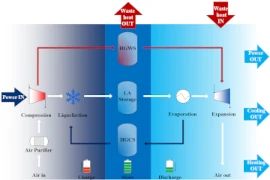Peer-reviewed Publications
Information
This section comprises all of my scientific peer-reviewed publications.
Go to the complete list of my publications or browse the list of my recent and forthcoming publications below.
Go to the complete list of my publications or browse the list of my recent and forthcoming publications below.
Forthcoming & Recent publications
Conference paper
In: Proceedings of the 2025 IEEE PES 17th Asia-Pacific Power and Energy Engineering Conference (APPEEC),
IEEE,
December 2025
(in press)
Abstract: The final energy consumption of the transport sector of the Association of Southeast Asian Nations (ASEAN) has grown 1.96-fold since 2005. The continuation of historical trends is expected to result in a 2.6-fold increase by 2050 as compared to 2022. This paper analyses the future road transport energy demand of ASEAN by applying a bottom-up approach through the energy demand …
(Continue reading)
Journal article
In: Journal of Energy Storage,
Elsevier,
October 2025
Abstract: A liquid air energy storage (LAES) system is a promising Carnot battery configuration capable of efficiently recovering waste heat and cold energy carriers. Among these, liquid hydrogen (LH2) regasification presents a significant opportunity due to its high exergy content and its regasification temperature, which aligns well with the liquid air liquefaction process. …
(Continue reading)
Journal article
In: Renewable Energy,
Elsevier,
August 2025
Abstract: The rising demand for cooling poses significant environmental challenges, especially in regions relying on carbon-intensive grid electricity. In this study, a geothermal-driven combined cooling and power system (GCCPS) containing an absorption chiller (AC) and an organic Rankine cycle (ORC) for combined production of power and cooling is proposed. The system’s …
(Continue reading)
Journal article
In: International Journal of Hydrogen Energy,
Elsevier,
June 2025
Abstract: Liquid hydrogen (LH2) is a promising solution to transport green hydrogen to countries lacking domestic energy resources. One challenge in simulating the liquefaction process is the exothermic ortho-para conversion (OPC). Orthohydrogen is converted to parahydrogen during the process to prevent the liquid hydrogen from evaporating due to the exothermic conversion in …
(Continue reading)
Journal article
In: Sustainability,
MDPI,
May 2025
Abstract: As the energy sector transitions toward decarbonisation, low-to-intermediate temperature geothermal resources in sedimentary basins—particularly repurposed oil and gas fields—have emerged as promising candidates for sustainable heat and power generation. Despite their widespread availability, the development of these systems is hindered by gaps in methodology, oversimplified …
(Continue reading)
Journal article
In: Renewable and Sustainable Energy Reviews,
Elsevier,
March 2025
Abstract: Global geothermal energy utilisation for power generation and direct-use applications have increased over the past 25 years, with Asia having the fastest growth in direct-use applications, which suggests a high demand for geothermal resources in Asia. This review seeks to fill a critical gap in the existing literature on geothermal development in South, Southeast and East Asia. …
(Continue reading)
Conference paper
In: Proceedings, 50th Workshop on Geothermal Reservoir Engineering,
Stanford University,
February 2025
Abstract: Singapore is a small, densely populated urbanized city-state that relies on energy imports for self-sustainability and security due to the lack of natural resources. Aside from renewable energy sources, including solar energy, geothermal power could also be a viable domestic source of energy. Hot springs and anomalous regional heat flow indicate that the country have geothermal …
(Continue reading)

